|
|
|
Europe and North Asia Forest Law Enforcement and Governance
6-8 June, 2005 Moscow, Russia
|
|
|
|
|
|
IISD's SUMMARY REPORT
is available
online in the following formats:
|
|
|
|
|
| On the second day of the ENA FLEG Preparatory Conference, participants continued discussions on major issues in regional and thematic break-out groups and in plenary sessions. In the morning, participants briefly reconvened in regional break-out groups, before participants heard reports of the groups in a plenary session. Thematic break-out groups also met in morning sessions, and reported back to the plenary in an afternoon session. In the afternoon, participants also heard presentations on the integration of the ENA FLEG process with existing processes. |
|
| Defining Issues in Regional Break-out Groups |
|
| In the Enlarged EU Cluster group, participants were called upon to suggest key issues of concern to all countries. In the ensuing discussion a number of points were highlighted, in particular, political will to implement regulations, clear definition of illegal logging, transparency, access to forest information, recognition of the existence of different laws and practices, green public procurement, involvement of different ministries, the social value of forests, voluntary code of conduct for the private sector, partnerships with exporter countries, and capacity building in developing countries. |
| |
| |
| In the regional break-out group for the Central Asia, Caucasus and South-East Europe Cluster (below), group participants based their discussion on two separate topics: the commercial and domestic use of forests related to illegal logging activities. On domestic reasons participants raised: the need for economic alternatives to ensure livelihoods, that short term planning interests dominate individual decisions, and the lack of alternatives available to local people. |
| |
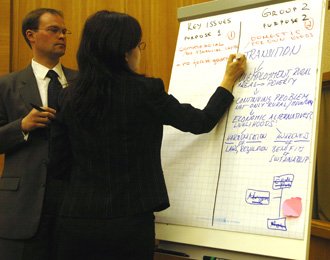 |
|
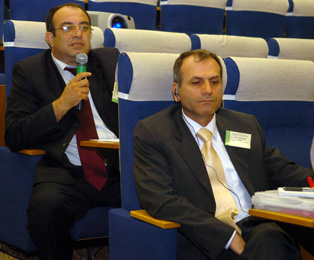 |
|
| |
During the break-out group on Northeast Asia, moderated by Evgeny Kuzmichev of Russia, participants discussed the key challenges and opportunities for arresting illegal forest exploitation in the region, underscoring the need to: address consumer demand in neighbouring China and Japan; step up legislative reforms; disclose customs and other pertinent information; create employment opportunities to stop migration, and ensure biodiversity conservation of key species such as the Siberian tiger, the Siberian crane and the Pacific salmon. |
| |
| |
| Stuart Wilson, Forest Monitor, during the discussion in the North-East Asia break-out group. |
| |
In the Northeast Europe break-out group, participants began discussing major FLEG issues for the region. Anders Portin, Finland, moderated the discussion, and Laura Ivers served as the Rapporteur. |
| Regional Breakout Groups report back to Plenary |
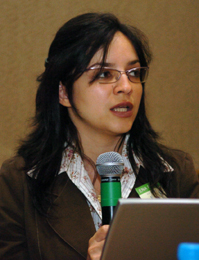 |
|
|
Summarizing the discussion from the Central Asia, Caucasus and South-East Europe break-out group, Dolores Beloretchka, National Forestry Board of the Bulgarian Ministry of Agriculture and Forestry (left), noted the major outcomes that emerged from the group discussion, which included strengthening the rule of law and improving existing forest institutions.
On behalf of the Enlarged EU break-out group, Janis Birgelis, Ministry of Agriculture of the Republic of Latvia (center), said the group highlighted: the importance of clear and simple legislation; common understanding of definitions and scope and illegality; information sharing and exchange of experiences between all stakeholders; capacity building of forest owners, civil society and government; and traceability of origin of imported timber.
Speaking for the North-East Europe break-out group, Anders Portin, Ministry of Agriculture and Forestry, Finland (right), noted outcomes of the group's discussions, including the need for comprehensive, comparable and accurate data, and greater civil society engagement.
On the outcomes of the North-East Asia break-out group, Nalin Kishor, World Bank (not pictured), said the group identified socioeconomic processes such as high rates of unemployment, migration from the region, and high demand for timber from neighboring China and Japan as key factors that fuel illegal logging. |
| Defining Issues in Thematic Breakout Groups |
| Information and Transparency |
| |
|
Andrey Kushlin, World Bank (right), moderated the group on information and transparency, in which it was agreed that objective information on illegal logging is critical. Some national experiences were reported and constraints identified, and participants highlighted lack of effective tracing methods, restricted public access to data and information. Solutions were proposed, inter alia, on standardizing information, making it reliable and easily accessible, using geographical information systems, creating comprehensive data bases, arranging an information validity forum, and replacing licensing and quota systems, which foster corruption. |
|
|
| |
| |
| Sophiko Akhobadze, Minsitry of Environmental Protection and Natural Resources of Georgia (left) and Ahmet Ulukanligil, Ministry of Environment and Forestry of Turkey (right) |
| |
| Institutions, Legislation and Law Enforcement |
|
A second working group, moderated by Victor Teplyakov, IUCN Global Temperate and Boreal Programme Coordinator of Russia (lower right), addressed institutions, legislation and law enforcement. Participants discussed, inter alia: legislative and governance reforms in ENA countries, national and international law enforcement and harmonization; regional and cross-sectoral cooperation; access to information; and capacity building. They highlighted the dual challenge of the need to strengthen and simplify laws on illegal logging to make them enforceable. Regarding opportunities to improve law enforcement, participants suggested addressing the root causes of illegal logging, partnering with anti-money-laundering institutions, improving public procurement and trade policies, and creating legislative incentives. |
|
| |
| Jovica Ristovski, Ministry of Agriculture, Forestry and Water Economy of Macedonia, and Dusan Jovic, Serbia and Montenegro |
| |
| Stefanie von Scheliha, German Ministry of Consumer Protection, Food and Agriculture |
| |
| Enterprise and Forest Management |
| |
|
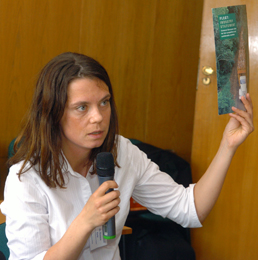 |
|
| |
|
Karin Wessman, WWF Sweden (left) and Rapporteur Elena Kulikova, WWF Russia, and Moderator Robert Kirmse, World Bank
Bob Kirmse, World Bank (above right), moderated the thematic break-out group on enterprise and forest management, which focused on issues related to private industry. Participants debated what the forest industry could, at present, address and what it would like to see addressed in the future. In the ensuing discussion, participants highlighted the need for independent auditors to decide on sustainable practices, the importance of reliable statistics, and the
significance of proper regulation enforced by appropriate lawmakers. Participants also debated whether there was a healthy investment climate in the Russian Far East, if the problem of accounting for forest exports is due to misidentification of species or the long supply chain and too many intermediaries, and how the private sector can become more engaged in contributing to inputs for the ENA FLEG Ministerial Conference. |
| |
|
| |
| Tono Kruzic, Ministry of Agriculture, Forestry and Water Management of Croatia |
| |
| Forest Governance and Livelihoods |
|
Moderator John Hudson, UK Department for International Development (center), and Rapporteur Serguei Milenin, World Bank (left) and Eva Muller, FAO (right)
In the forest governance and livelihoods break-out group, Moderator John Hudson, UK Department for International Development, suggested participants explore the following themes: whether laws related to forests are consistent and supportive of local livelihoods and applied fairly; whether poor people are involved in illegal activities, and if so, why; and what principles can guide local communities in protecting and promoting livelihoods. Participants discussed, inter alia, issues of de facto and de jure land tenure and land rights, the necessity of involving stakeholders in forest management, and the need in certain countries for engaging third parties to protect biodiversity and ensure proper forest management. |
| Report of Thematic Breakout Groups back to Plenary |
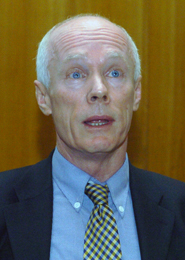 |
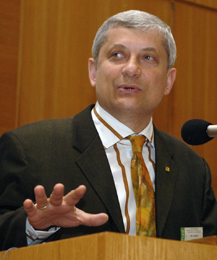 |
|
|
Moderators John Hudson, UK, Forest Governance and Livelihoods, Andrey Kushlin, World Bank, Information and Transparency, and Robert Kirmse, World Bank , Enterprise and Forest Management
Speaking for the forest governance and livelihoods break-out group, Rapporteur Serguei Milenin,
World Bank (not pictured), indicated the group's three major conclusions: policies and administrative arrangements should change in many countries, so that access to forest resources for the poor is not lost; there is a need to further define the role and responsibilities of those actors that work in the field of forest management; and to make sure the right population is targeted for the FLEG implementation process.
Moderator Andrey Kushlin, World Bank (center), and Lars Laestadius, World Resources Institute (not pictured), reported on conclusions reached on information and transparency, including the importance of reviewing definitions of confidentiality rules regarding commercial and state information, sharing information and establishing compatible information standards, and dividing responsibility between government and private sectors.
On behalf of the enterprise and forest management group, Moderator Bob Kirmse, World Bank (right), said the group suggested creating a definition of illegal logging based on what industry can actually address, making reliable and transparent forest industry-related information and statistics, applying certification and log-tracking, creating incentives for small and medium-sized companies, and respecting private property rights.
|
|
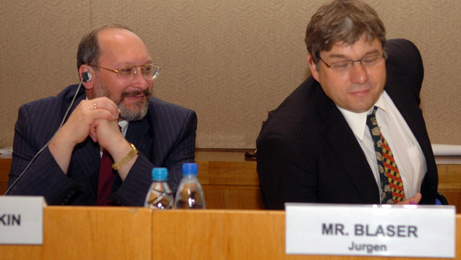 |
|
Nikita Bantsekin, Ministry of Natural Resources of Russia, and Jürgen Blaser, ENA FLEG Co-facilitator (left)
Victor Teplyakov, IUCN, and Moderator for the institutions, legislation and law enforcement break-out group (right), presented its recommendations, which include, inter alia : amending legislation with a view of simplifying and harmonizing it nationally and regionally; ensuring access to justice and information; promoting international and cross-sectoral cooperation and partnerships; and developing a system of economic incentives and sanctions to ensure SFM. |
|
| Integration with Existing Processes |
|
In the afternoon Plenary, a number of presentations were given on integration with existing processes. The presentations were on the subjects of inter-governmental negotiations, including the process leading to the ENA FLEG Ministerial Conference, the Ministerial Conference on the Protection of Forests for Europe, the multi-stakeholder preparatory process, industry perspectives, and FAO/UNECE and regional FLEG activities. After the session, a number of participants met in a drafting committee to compose an issues paper as the basis for tomorrow's discussions. |
| Jag Maini, ENA FLEG Co-facilitator, Zhang Lei, State Forestry Administration of China, with interpreter, Gerhard Dieterle, World Bank, Jurgen Blaser, ENA FLEG Co-facilitator, and Sophiko Akhobadze, Ministry of Environmental Protection and Natural Resources of Georgia |
Sophiko Akhobadze, Ministry of Environmental Protection and Natural Resources of Georgia, focused on the crucial role of forests in her country, including as a major fuel source.
Zhang Lei, State Forestry Administration of China (right), (with interpreter), addressed the national situation with illegal logging and the government's commitment to combating the practice, and called on countries to contribute to definitions and criteria to help restrict illegal logging and trade. |
| |
| Alexey Naumov, IKEA, Victor Teplyakov, IUCN, Eva Muller, FAO, Jürgen Blaser, ENA FLEG Co-facilitator, Malgorzata Buszko-Briggs, Ministerial Conference on the Protection of Forests in Europe (MCPFE) Liaison Unit, and Marina Smetanina, World Bank Moscow Office |
| |
Eva Muller and Jurgen Blaser (left) and Jag Maini (right)
Jag Maini, ENA FLEG Co-facilitator, gave an overview of FLEG as an intergovernmental process, focusing on its expected outcome, structure, and follow-up activities. Noting experiences from FLEG processes in Africa and East Asia, he said the key objective of a Ministerial Declaration is to seek political commitment to address illegal logging and associated FLEG issues. |
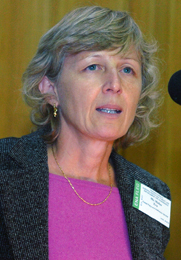 |
|
|
|
Eva Muller, FAO, highlighted the FAO/ITTO Best Practices for Improving Forest Law Compliance as a strategic approach to combat illegal logging, and offered FAO's support to FLEG, including organizing a workshop on Best Practices implementation in the ENA region.
Malgorzata Buszko-Briggs, Ministerial Conference on the Protection of Forests in Europe (MCPFE) Liaison Unit, reported on the Ministerial Conference on the Protection of Forests of Europe, its goals, structure and role as a high-level political initiative and forum dedicated to the implementation of SFM, and on its growing link to the forest law enforcement, governance and trade process.
Alexey Naumov, IKEA, explained work done by his company on tracing wood sources, cooperating with WWF on illegal logging, providing informational guidance and educational materials to the public and private sectors.
Victor Teplyakov, IUCN, focused on the multi-stakeholder preparatory process and lessons learned from the African, East Asia FLEG and the ENA FLEG in Russia, in particular, the need to involve civil society and all relevant government departments. |
|
 |
Relevant links |
 |
|
|

© 2005,
IISD. All rights reserved.
|